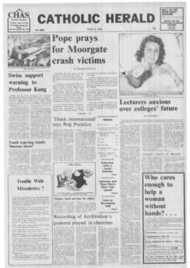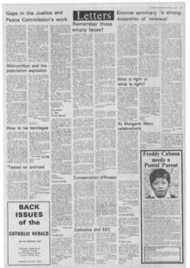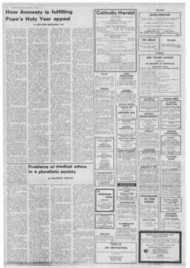Page 10, 7th March 1975
Page 10

Report an error
Noticed an error on this page?If you've noticed an error in this article please click here to report it.
Tags
Share
Related articles
African Church-state Rift Healed
Pope Reaches Out On African Pilgrimage
Church-state Breach In African Republic Healed
Scramble For Africa At Root Of Zaire Conflict
Zaire Bishops Ask President To Explain Intentions
Conflict between Church in Zaire and 'Messiah'
From MICHAEL WILSON in Rome The Catholic Church in Zaire today faces open persecution and virtual suppression if President Mobutu Sese Seko carries out his threat to "close every Roman Catholic church in the C ountry." Reports reaching here show that his announced plan is to elevate the People's Movement. of the Revolution (MPR) to the status of a Church and to promote this "Mobutism" as a national ancestor-worship "authenticity" church with himself as Messiah.
Mobutu's latest warning, delivered to a packed and howling Kinshasa stadium on February I, follows specific actions against Christians and especially the Catholics in this former Belgian Congo territory.
He has taken over all schools, most of which are operated by the Catholic or other Christian Confessions: banned all religious teaching (except Mobutism) in the schools: suppressed the Faculties of neology in the National University, and replaced crucifixes and photographs of Pope Paul VI by ones of himself.
The Zaire Episcopal Conference took the threat to the Faith and the Church so seriously that it met for nine days in Kinshasa in January and issued two formal declarations.
The first, significantly enough, was a Declaration of Faith in Jesus Christ. It did not gloss over the perils of the moment but opened with the words: "At a time when our country finds itself w, a decisive turning point of its history, at a time when many Christians are, deeply shaken in their faith in Jesus Christ, we, the bishops of Zaire . . . exhort the people of God to persevere in their faith . ."
This declaration. signed by all 47 bishops, of whom 39 are native Zaireans, was published
Jistributed throughout the u:ition as a pastoral letter destined for Zaire's 9.5 million Catholics one third the population of the country.
The second declaration, also signed by all the bishops, was a detailed analysis of the situation and the measures that the episcopate would take to meet the threat to Christianity. It was read publicly from, at least, all pulpits in Kinshasa.
Faced with the fait accompli of school take-overs, suppressisal of religious instruction in schools, banning of religious youth organisations. church periodicals. newspapers and broadcasts plus the creation of "authenticity" as a church, the episeopate reacted strongly but tactfully. It said: "We are faced with a historical situation in Zaire in which certain 'Pacts pose a problem for the Church, calling into question its status, its possibilities of acting in our society and its whole future an our country.
fhe bishops saw no problem in accepting the two principles of "laieity" and "authenticity" on which the State was insisting. But they found the ways in which these were expressed in Zaire as being "anti-religious, or at least antiChristian."
The Church in Zaire, they said, "will have to seek new pastoral methods, which will not be linked to temporal structures but will hand on the Gospel message through the witness of its being and of each individual Christian as he plays his part in the different sectors of' national activity and Ile velopment." The bishops noted "the suppression dated December 30, 1974, of the national network of Catholic schools" and, as a result, "declare that the Catholic Church is freed from any contractual obligation
APPOINTMENTS
NEW SALFORD DEAN
Dean Michael Reynolds. parish priest of St Pendletore has resigned en Deem of John's Deanery. Salford a post he has ;mid eine 1955. His stmeaseor is Dean Jemes Dwyer, earistt priest of St Thomas of Canterbury. Higher Broughton. since 1972. Dean Dwyer, 54. 8 brother of Archbishop George Patrick Dwyer of Birmingham, was horn in Miles Platting Manchester. and was educated at St Bede's College, Manchester. and Ushsw College. Durham.
Ho was ordained priest In 1946 and has served in the Salford diucese on the staff of St Bede's College and in parishes in Denton. Longsight. Stretford, Billington and Beetle. He was chaplain at Hopwood Han College of Education; Middleton, and at the Good Shepherd Convent. Hinkley, and chief diocesan religious inspector of schools from 1966 to 1973 Fr Reynolds will continue as parish priest of St James. where the opening of the new church is expected later this year. He has been in Salford since 1940. first as administrator of St John's Cathedral and then. since 1948, as parish priest of St James. On June 28 of this year he will celebrate' the golden jubilee. of his ordination as a priest. towards the State or individual citizens in SO far as the direction or administration of these nationalised schools are concerned." They authorised priests and religious to continue as directors of these schools "only as substitutes and only until the end of the present school year in June."
They further withdrew all priests and religious who had been teaching religion so that they might continue their catechetical work outside of school hours.
And they emphasised: "No Catholic teacher or pupil is free to renounce or pretend to renounce his Faith in Jesus Christ, for 'whoever denies me before men,' said Our Lord. 'I also will deny before my Father who is in heaven.'" Again, with regard to medical, charitable and social work, in which the Catholic Church has been heavily involved, the bishops declared that: "the Catholic Church remains willing to continue. in dialogue with the Government authorities, its extensive contribution to the full measure of its means," But the episcopate ruled that the Church as an institution would disengage itself progressively front temporal administration, and that priests and religious who are directing such works should train lay people to take over from them.
Behind much of this conflict between Mobutu and the Church in Zaire lie the latent memories of the prerevolutionary era when the Belgian hierarchy in the Congo almost invariably sided with the government officials in suppressing all native initiatives.
The revolutionary leaders such as Mobutu appear unable to grasp the concept of a Church that can be autonomously disposed to do all in its power to forward the legitimate aspirations of an independent people and yet form part of the Universal Church under the tutelage of the Vicar
of Rome at least outwardly.
Closer to the truth is perhaps the leaders' realisation, say observers returning from Zaire. that failures of promoting the welfare of the peoples may be blamed upon them and not upon the Church.
Cardinal Joseph Malula is the' only Zairean in the nation who is as well known to .all as Mobutu. This rankles, sa.}. thesc observers, with as a result the decision to form a new religion. a new Church, based on himself as Messiah.
Mobutu was baptised a Catholic but is reported to have ceased going to Mass in 1973. calling priests "foreign agents."
blog comments powered by Disqus











